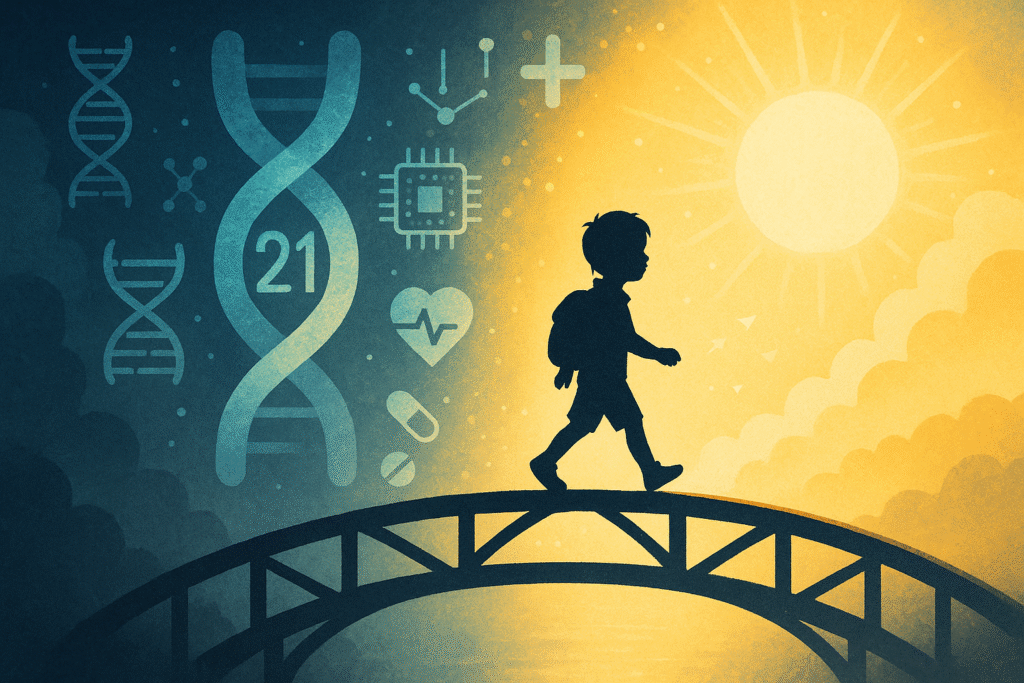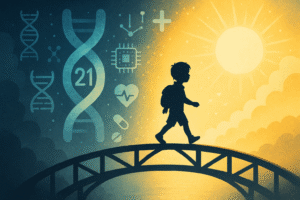
When Science Redefines What’s Possible for People with Down Syndrome
A Future-Oriented Medicine Serving Quality of Life

A Paradigm Shift Underway
Long viewed through a narrow, deficit-focused lens, Down syndrome (or Trisomy 21) is now undergoing a significant scientific and medical shift.
While prenatal diagnosis is well mastered in many countries, improving quality of life, autonomy, and social inclusion has become the new challenge.
This shift is supported by major breakthroughs in various fields of research.
Understanding Down Syndrome Today: A Status Report
Before exploring potential solutions, it is essential to understand the clinical and epidemiological realities.
Down syndrome is caused by the presence of an extra copy of chromosome 21. It affects approximately 1 in 700 to 1,000 births, depending on the region.
- Average life expectancy: increased from 25 years in 1983 to over 60 years today in developed countries (CDC, 2023).
A remarkable improvement reflecting the cumulative impact of medical, social, and educational advances. - Prevalence in Africa: about 1 in 1,000 births, with significant disparities between urban areas (where prenatal screening is available) and rural or remote areas (where healthcare access is limited).
Common comorbidities:
✔ Congenital heart defects (present in about 50% of children)
✔ Vision and hearing disorders
✔ Hypothyroidism
✔ Early-onset Alzheimer’s disease
Medical Advances Offering Hope
Targeted Therapies and Innovative Medications
In recent years, pharmacological compounds targeting synaptic function and memory have been studied to improve cognitive abilities in children with Down syndrome.
Examples include:
- SAR443809 (Sanofi, phase II clinical trials)
- Bupropion, tested to modulate certain brain functions
Promising clinical trials are underway in the United States, France, and Japan. These molecules aim to:
- Improve short-term memory
- Strengthen neural plasticity
- Reduce early symptoms of Alzheimer’s disease
Research by Prof. Stylianos Antonarakis at the University of Geneva suggests that cognitive anomalies in Down syndrome are not irreversible.
By acting early on genetic and synaptic mechanisms, it may be possible to positively influence neurocognitive development trajectories.
— Inspired by the work of Prof. Stylianos Antonarakis (University of Geneva, Nature Reviews Genetics, 2004)
Early and Multidisciplinary Care
Multidisciplinary care starting from the first months of life is recognized as a key factor in long-term autonomy.
Integrated models are emerging across the African continent:
- South Africa: The Down Syndrome Association program (founded in 1986) trains community health professionals in early care.
- Senegal: The Jacaranda Center in Dakar (founded in 2009) provides coordinated medical and educational follow-up with families.
Technological Innovation to Promote Autonomy
Mobile Apps and Connected Devices
Apps such as “Oto” (France) and “Speech Blubs” (USA) use artificial intelligence to support speech and communication through:
- Voice recognition
- Progress tracking
- Personalized recommendations
In Africa, tools like Vula Mobile (South Africa) improve coordination between general practitioners and specialists in rural areas — a valuable innovation in medically underserved regions.
Examples of connected devices:
- Smart bracelets for tracking sleep and physical activity
- Smart glasses to stimulate visual attention
- Multisensory rooms in hospitals in Morocco and Ghana
Inclusion and Quality of Life: A Multidimensional Fight
Quality of life depends on more than healthcare. A continuum of support is needed from birth through adulthood.
Key pillars include:
- Inclusive education
- Professional autonomy
- Family support
The WHO recommends integrated public health plans that include Down syndrome in disability policies.
Inspirational initiatives in Africa:
- Kenya: National neonatal screening policy since 2020
- Rwanda: Teacher training for inclusive education (with UNESCO)
- Tunisia: Startup Hope it Up, developing Arabic educational materials
These initiatives reflect a continent-wide movement toward transformation.
Toward More Personalized and Inclusive Medicine
Current research shows it is possible to intervene early in the cognitive and social development of individuals with Down syndrome.
The global challenge is clear, but the African context requires adapted responses:
- Equitable access to care
- Frugal innovation
- Cross-sectoral approaches
Did you know?
🔹 6 million people live with Down syndrome worldwide
🔹 Life expectancy has more than doubled in 40 years
🔹 50% are born with heart defects
Keywords
Down syndrome | Quality of life | Early care | Medical technologies | Social inclusion | Scientific advances
References
- World Health Organization. (2022). Disability and health. https://www.who.int/news-room/fact-sheets/detail/disability-and-health
- Down Syndrome International. (2023). Global reports and strategies. https://www.ds-int.org
- Centers for Disease Control and Prevention. (2023). Facts about Down Syndrome. https://www.cdc.gov/ncbddd/birthdefects/downsyndrome.html
- The Lancet Neurology. (2022). Cognitive interventions in Down syndrome: A review.
- African Academy of Sciences. (2021). Health innovation programs in Africa. https://www.aasciences.africa
- Sanofi. (2024). Clinical trial data on SAR443809. https://clinicaltrials.gov
- UNESCO. (2023). Inclusive education in Africa: Programmes and partnerships. https://unesdoc.unesco.org


